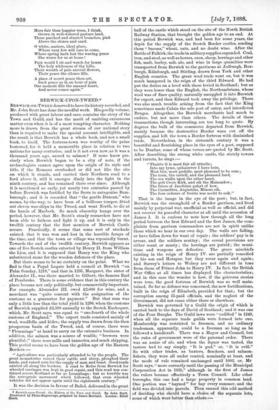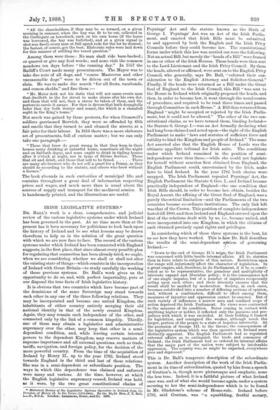BERWICK-UPON-1 W BED.*
BERWICK-ON-TWEED deserved to have its history recorded, and Mr. John Scott has done the needful work. His goodly volume, produced with great labour and care, contains the story of the Town and Guild, and has the merit of omitting extraneous
matter even when it is of a most tempting character. Nothing more is drawn from the great stream of our national story than is required to make the special account intelligible, and the result is that Berwick has a whole book, and not a small book, to itself. The fortress-town was worthy of the pains bestowed, for it held a memorable place in relation to two nations for many centuries; and is it not even now, as it was a thousand years ago, sacred to salmon P If none know pre- cisely when Berwick began to be a city of note, if the archaologists cannot agree upon the origin of its style and title, if the Romans overlooked or did not like the site on which it stands, and carried their Northern road to a ford above it, still it emerges dimly into the light in the ninth century, and has remained there ever since. Although it is mentioned so early, yet nearly two centuries passed by before Berwick was fortified by the Scots to antagonise Barn- borough; and it is recorded that "the gentle Duncan," who seems, by-the-way, to have been of a bellicose temper, fitted out eleven war-ships in the Tweed, and went North, to die at the hands of Macbeth. So much obscurity hangs over the period, however, that Mr. Scott's steady researches have not been able to fathom and light it up, and it is only in the
twelfth century that the first mention of Berwick Castle occurs. Practically, it seems that some sort of stockade existed, that it was won and lost in the horrible forays of -the time, and that the town or village was repeatedly burnt. Towards the end of the twelfth century, Berwick appears as
one of five Scotch castles extorted by Henry II. from William the Lion, and it is supposed that Henry was the King who substituted stone for the wooden defences of the place.
But there seems to be no certainty on the point. What we Turd is that a Papal Legate held a council at Berwick "on Palm Sunday, 1218," and that in 1235, Margaret, the sister of Alexander II., was there married to Gilbert, the famous Earl of Pembroke. There is some evidence that in this century the place became not only politically, but commercially important. For example, Alexander III. owed 22,000 for wine, and a merchant was "quite content with the assignation of the customs as a guarantee for payment." But that sum was only a little less than the total yield in 1286, when the customs of Berwick supplied 22,190 annually to the Scotch Exchequer, which, Mr. Scott says, was equal to "one-fourth of the whole customs of England." The export trade consisted mainly of wool, woollens, and hides; the supply was drawn from the then prosperous basin of the Tweed, and, of course, there were "‘` Flernmings " at hand to carry on the extensive business. In addition, the salmon was a source of wealth; "brewers were plentiful ;" there were mills and tanneries, and much shipping. This period seems to have been the golden age of the Eastern Borders :—
"Agriculture was particularly attended to by the people. The great monasteries reared their cattle and sheep, ploughed their lands, and raised corn for the supply of man and beast. Good roads existed all along the borders. A road to Kelso from Berwick for -wheeled carriages was kept in good repair, and this road was con- tinued across Scotland as far as Lesmahago : but in terrible was the retrograde movement which followed, that even wheeled vehicles did not appear again until the eighteenth century."
It was the decision in favour of Baliol, delivered in the great * Benciek-upon-7'weed : the History of the Town and Guild. By John Soon. Illustrated by Photo-Engravings, prepared by James Herriott, London: Elliot !Rook.
hall of the castle which stood on the site of the North British
Railway Station, that brought the golden age to an end. At this period Berwick was, and had been for some years, the
depot for the supply of the Scotch Border castles, sending them" bacons," wheat, oats, and no doubt wine. After the Battle of Falkirk, the trade in military supplies expanded. Coal, iron, and steel, as well as horses, oxen, sheep, herrings and other fish, malt, barley, salt, ale, and wine in large quantities were transported from Berwick to the garrisons at Jedburgh, Rox- burgh, Edinburgh, and Stirling, drawn from York and other English counties. The great wool trade went on, but it was much hampered in the reign of the third Edward. He had put the duties on a level with those levied in Scotland; but as they were lower than the English, the Northumbrians, whose wool was of finer quality, naturally smuggled it into Berwick for export, and then Edward took away the privilege. There was also much trouble arising from the fact that the King sometimes made Calais the sole port of entry, and interdicted Bruges. Altogether, the Berwick merchants had much to endure, but not more than others. The details of these transactions, though interesting, are too long to quote. By degrees the bulk of the commerce departed from Berwick, mainly because the destructive Border wars cut off the supplies, and left the town a Border fortress with diminished trade. Nevertheless, in the sixteenth century it was a beautiful and flourishing place in the eyes of a poet, supposed to be Dunbar, some of whose verses are quoted by Mr. Scott. After describing the strong white castle, the stately towers and turrets, he sings :— " Thairto it is most fair all atterlie ;
Into my tyme, quhairever I have bein,
Most fair, most gudelie, most pleasaud to be sene ; The toun, the castell, and the pleasand land, The sea wallis upon the uther hand, The grit Croce Kirk, and eik the Maisondew; The friers of Jacobinis quhyt of hew, The Carmelites, Augustins, Minors eik,
The four ordours of freiris war nocht to sulk."
That is the image in the eye of the poet; but, in fact, Berwick was the stronghold of a Border garrison, and lived mainly by perpetual war, unofficial as well as official, and did not recover its peaceful character at all until the accession of James I. It is curious to note how through all the long period between the first Edward and the first James, the com-
plaints from garrison commanders are not in spirit unlike those which we hear in our own day. The walls are falling, or have fallen down for want of repair ; the soldiers' pay is in arrest-, and the soldiers mutiny; the cereal provisions are either scant or musty ; the herrings are putrid ; the muni- tions and weapons are defective. The grave mischiefs existing in the reign of Henry IV. are partially remedied
by his son and Hotspur, but they recur again and again; and Surrey's letters to Wolsey are not different in tone from those of Prince John to Henry IV. In fact, the British War Office at all times has displayed like characteristics ; and in this case the wonder is how, if the grievous stories were true, the good fortress of Berwick was so well main- tained. So far as defence was concerned, the new fortifications, built in the reign of Elizabeth, provided for that; but the corruption among ill-paid officials, and the neglect of the Government, did not cease either there or elsewhere.
Berwick was governed by a Guild the origin of which is carried back to the days of David of Scotland; and it was one of the Four Burghs. The Guild laws were " codified " in 1249, when all the separate trade guilds were formed into one. Membership was restricted to freemen, and no ordinary tradesman, apparently, could be a freeman so long as he followed a handicraft. There was a Mayor and Council, but the rules of government were of the paternal order. There was an assize of ale, and when the liquor was tasted, the tasters had to say simply, "It is glad," or, "It is evil."
So with other trades, as batters, fleschers, and salmon- fishers, they were all under control, nominally at least, and the mode of rule remained unchanged until 1603, or, Mr Scott says, "more correctly until the passing of the Municipal Corporation Act in 1835," although in the first of James the rulers became effectively a Town Council. Like other boroughs, this one had a large property in common land. One portion was " hayned " for hay every summer, and the field was divided into parcels. Then ensued this odd method of deciding who should have a choice of the separate lots, some of which were better than others
"All the shareholders, if they may be so termed, on a given morning in summer, when the hay was fit to be cut, collected in the Castlegate on horseback, each on his own horse (if the horse was borrowed, the hay was forfeited), and at a given signal (a shot was fired) every man at full speed rode for the lot he desired; the fastest, of course, got the best. Elaborate rules were laid down for this manner of settling the vexed question."
Among them were these : No man shall ride bare-backed ; or quarrel or give any foul words ; and none visit the common meadows ten days before "the running day." In 1557 the Bailiff's Court made many presentments. The Mayor was to take due note of all dogs, and "coarse Masteeves and other vnreasonable dogs" were to be driven out of the town or slain. He was to make due search "for all Scots, va,cabonds, and comon skolds," and fine them :—
"Mr. Maior doth not his dude that will not cause everie man that dwelleth in the for streat to make cleane afor his own dor, and them that will not, then a stress be taken of them, and the portors to carrie it awaye. For ther is dyvers that hath dounghells befor ther dor both wenter and somer, the which is a shamfull seght in the King's tonne."
Not much was gained by these protests, for when Cromwell's soldiers garrisoned Berwick, they were so offended by filth and smells that they turned to and cleaned the streets, at a fair price for their labour. In 1616 there was a more elaborate set of presentments, full of curious matter ; but we can only take one paragraph :— "Those that brew do great wrong in that they keep in their houses many drinking at unlawful hours, sometimes all the night and on Sabbath dayes, and none ought to drink in tipling houses after 9 o'clock at night, nor in tyme of Divine Service. Those
that sit and drink, and those that sell to be fyned There are many ale-brewers who do not sell a quart for a Penny, as they should do according to the statute, and others who brew without a licence."
The book abounds in such. curiosities of municipal life, and contains throughout a great deal of information respecting prices and wages, and much more than is usual about the sources of supply and transport for the medimval armies. It is handsomely printed, and the illustrations are useful.



































 Previous page
Previous page